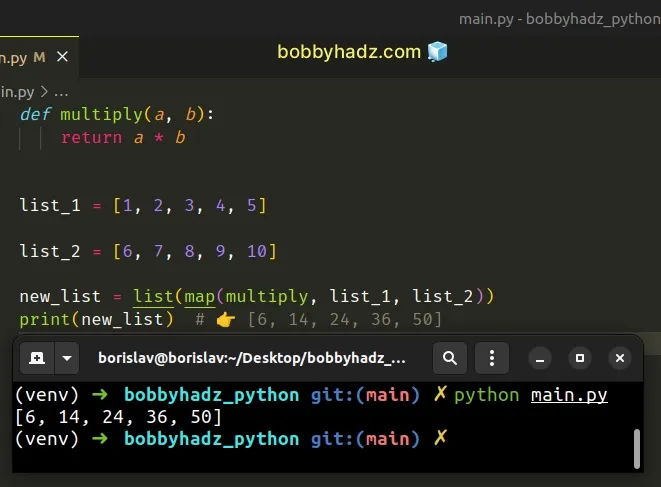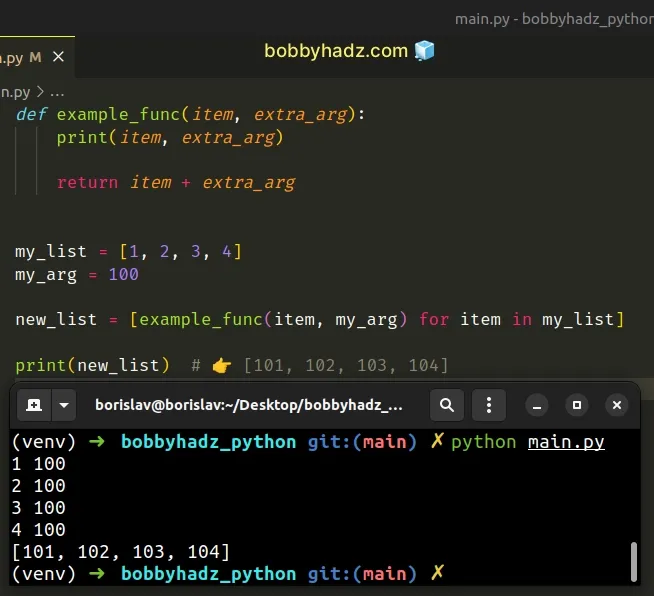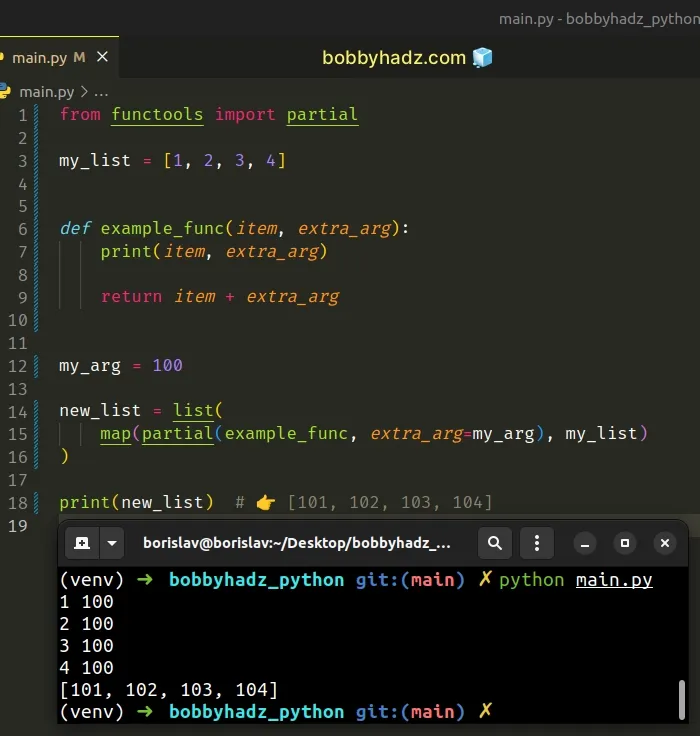Pass multiple arguments to the map() function in Python
Last updated: Apr 8, 2024
Reading time·3 min

# Table of Contents
- Pass multiple arguments to the map() function
- Using a list comprehension instead of the map() function
- Pass multiple arguments to the map() function using partial()
- Pass multiple arguments to the map() function using repeat()
# Pass multiple arguments to the map() function
You can pass a function, followed by multiple iterables to the map() function.
The map() function will call the supplied function with an item from each
iterable.
def multiply(a, b): return a * b list_1 = [1, 2, 3, 4, 5] list_2 = [6, 7, 8, 9, 10] new_list = list(map(multiply, list_1, list_2)) print(new_list) # 👉️ [6, 14, 24, 36, 50]

The map() function takes a function and one or more iterables as arguments and calls the function with each item of the iterables.
The map() function first called the multiply() function with the numbers 1
and 6, then with the numbers 2 and 7, etc.
You can use this approach with as many iterables as necessary.
However, make sure the function you pass to map takes exactly as many
arguments as there are iterables.
def multiply(a, b, c): return a * b * c list_1 = [1, 2, 3, 4, 5] list_2 = [6, 7, 8, 9, 10] list_3 = [1, 2, 3, 4, 5] new_list = list(map(multiply, list_1, list_2, list_3)) print(new_list) # 👉️ [6, 28, 72, 144, 250]
Notice that the multiply function now takes 3 arguments.
It gets called with 1 item from each iterable.
The map() function first calls multiply with 1, 6 and 1, then with 2, 7 and
2, etc.
# Using a list comprehension instead of the map() function
This is a three-step process:
- Use a list comprehension to iterate over each element of the iterable.
- Call the function, passing it each element and the extra arguments.
- The list comprehension will call the function for every element.
def example_func(item, extra_arg): print(item, extra_arg) return item + extra_arg my_list = [1, 2, 3, 4] my_arg = 100 new_list = [example_func(item, my_arg) for item in my_list] print(new_list) # 👉️ [101, 102, 103, 104]

List comprehensions are used to perform some operation for every element, or select a subset of elements that meet a condition.
The map() function takes a function and an iterable as arguments and calls the function with each item of the iterable.
Instead of using map(), in most cases, you can just use a list comprehension
and make your code a bit easier to read.
# Pass multiple arguments to the map() function using partial()
This is a three-step process:
- Pass the handler function and the arguments to the
functools.partial()method. - Pass the result and the iterable to the
map()function. - The handler function will get called the arguments on each iteration.
from functools import partial my_list = [1, 2, 3, 4] def example_func(item, extra_arg): print(item, extra_arg) return item + extra_arg my_arg = 100 new_list = list( map(partial(example_func, extra_arg=my_arg), my_list) ) print(new_list) # 👉️ [101, 102, 103, 104]

We used the
functools.partial()
method to pass multiple arguments to the map() function.
The method takes a function, positional and keyword arguments and returns a partial object.
When using the functools.partial() method, it's best to pass the arguments as
keyword arguments to not mix up the order.
# Pass multiple arguments to the map() function using repeat()
You can also use the repeat class from the itertools module to pass multiple
arguments to the map() function.
from itertools import repeat def multiply(a, b): return a * b list_1 = [1, 2, 3, 4, 5] new_list = list(map(multiply, list_1, repeat(5))) print(new_list) # 👉️ [5, 10, 15, 20, 25]
The itertools.repeat() class makes an iterator that returns the given object over and over again.
You can imagine that the map() function calls multiply with each item of the
list and the number 5 because that's what we passed to the
itertools.repeat() class.
Each of the numbers in the list gets multiplied by 5 in the example.
I've also written an article on how to get access to the index in the map() function.

